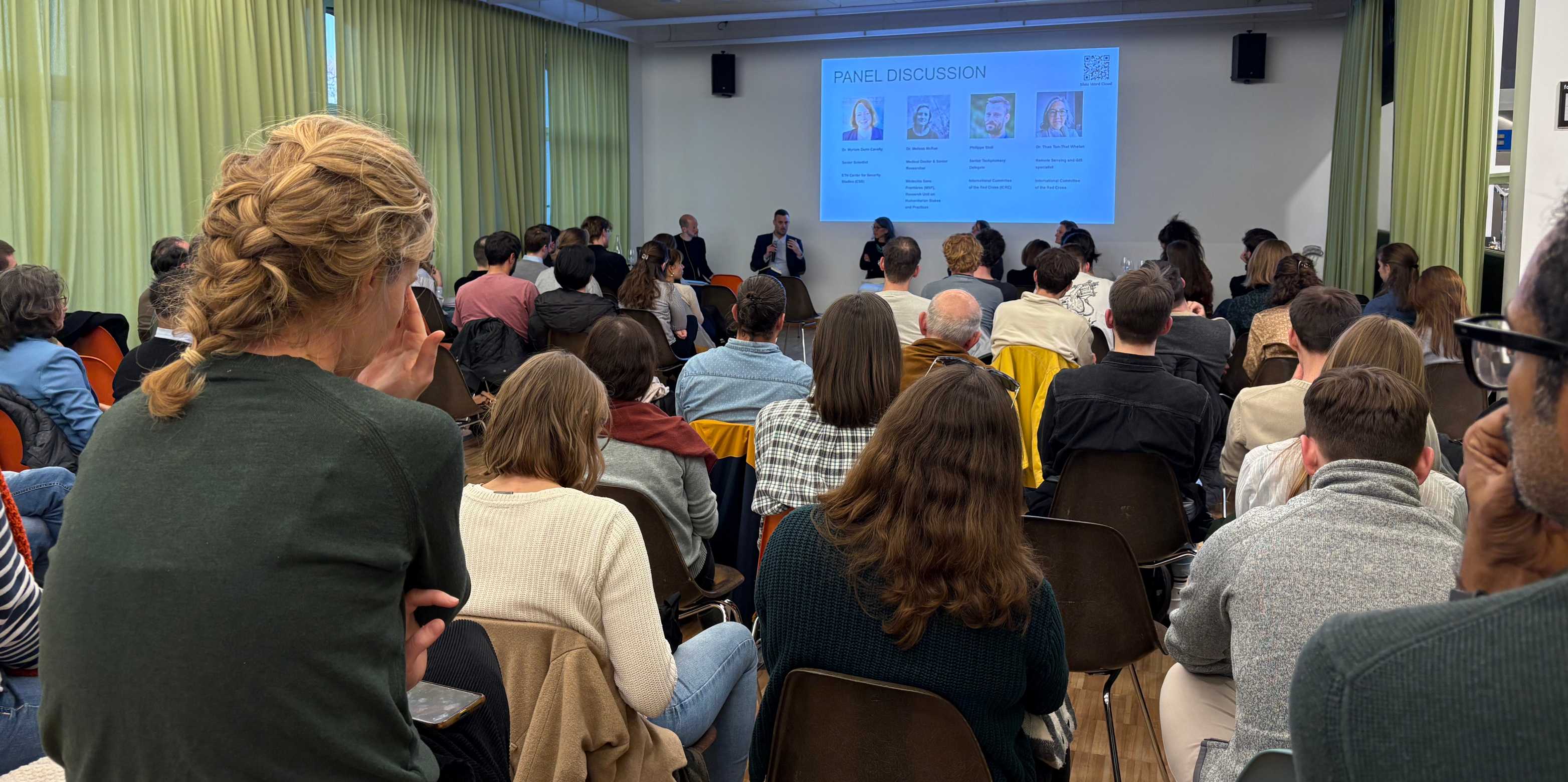A Conversation on Humanitarian Action in the Digital Age
The Humanitarian Action in the Digital Age event on 17 March 2025 brought together researchers from ETH Zurich and humanitarian practitioners from the International Committee of the Red Cross (ICRC) and Médecins sans Frontier (MSF) to discuss how AI and digital technologies are transforming the sector.

Moderator Sacha Meuter (Fondation Hirondelle) set the stage by highlighting the urgency of the discussion. With rising misinformation, geopolitical instability, and budget cuts humanitarian actors face a number of challenges. The event aimed to explore whether AI and digital technology could offer solutions, while also addressing its risks.
Engineering for Humanitarian Action
The event began with a series of research presentations showcasing projects that help humanitarian actors navigate the digital dimensions of armed conflicts and leverage AI and digital technologies to enhance humanitarian action. Several of these projects stem from the external page partnership between ETH Zurich, the ICRC, and EPFL.
- AI and Satellite Data for Conflict Monitoring: Dr. Corinne Bara (CSS, ETH Zurich) presented a tool that aims to detect crisis developments through satellite imagery. By analyzing nighttime light fluctuations, researchers can infer disruptions linked to conflict.
- Population Mapping for More Effective Humanitarian Action: Nando Metzger (Photogrammetry and Remote Sensing, ETH Zurich) introduced AI-driven algorithms that enhance population mapping in crisis zones. By improving the granularity of demographic data – such as in the Democratic Republic of Congo – these tools aim to support humanitarian organisations in planning their operations more effectively.
- Countering Digital Disinformation in Humanitarian Work: Sophie Natter (MSF) addressed the growing challenge of misinformation in the Sahel, where false narratives about humanitarian organisations spread rapidly. To combat this, MSF collaborates with social media companies and advisory groups to develop frameworks that counteract disinformation.
- Protection Framework for Digitized Conflict: Sean Cordey (CSS, ETH Zurich) presented research on a framework that aims to enhance awareness and preparedness for humanitarian organisations, enabling effective response to affected populations.
Panel Discussion: Can AI Help Us Do More with Less? What are the Risks & Limitations?
The research presentations set the stage for a panel discussion between researchers and humanitarian practitioners. Dr. Myriam Dunn Cavelty (ETH Zurich), Dr. Melissa McRae (MSF), Philippe Stoll (ICRC), and Dr. Thao Ton-That Whelan (ICRC) discussed AI’s role in humanitarian work, highlighting both opportunities and limitations.
Key Insights:
- AI’s Potential: AI can enhance crisis detection, predict epidemics, and improve resource allocation. It is particularly useful for translation, large-scale data analysis, and narrowing down search efforts in emergency response. There is a strong focus on computer vision and remote sensing in humanitarian efforts.
- Challenges & Ethical Concerns: Many AI models are trained primarily in English, limiting their usability in diverse humanitarian contexts. Data privacy, ethical concerns, and maintaining neutrality are key challenges when deploying AI.
- Dialogue with Tech Companies: Continuous dialogue with technology and social media companies is crucial.
- Balancing Innovation with Human Oversight: AI should support—not replace—human decision-making. The humanitarian sector must manage tech dependencies and ensure that AI solutions remain transparent and accountable. Coalitions are essential to regulate and prevent the misuse of AI in conflicts.
- Collaboration & Implementation: While academic research offers AI solutions, implementation remains difficult due to limited local resources. More co-designing and collaboration in the implementation phase between researchers and humanitarian practitioners are needed.
We sincerely thank all panelists and participants for their valuable contributions and look forward to fostering ongoing collaboration between academia and humanitarian organisations to navigate and shape the evolving field of AI and humanitarian action.
The event was organised in collaboration with ETH NADEL and the ETH Center for Security Studies.